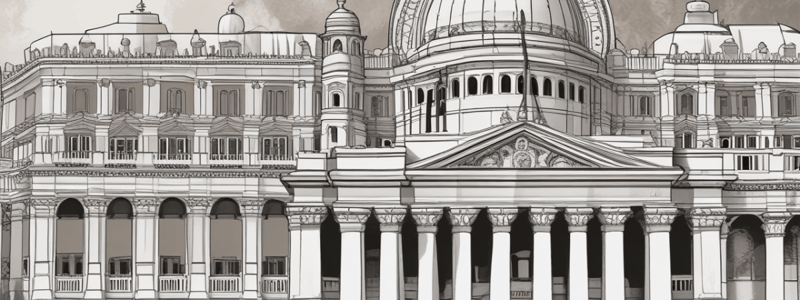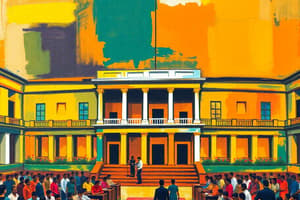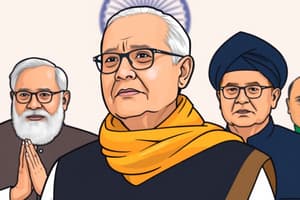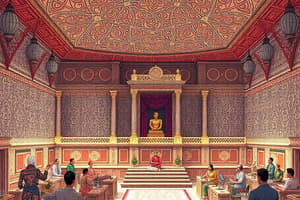Podcast
Questions and Answers
What happens if a deadlock over an ordinary bill between the two Houses of Parliament is unresolved for six months?
What happens if a deadlock over an ordinary bill between the two Houses of Parliament is unresolved for six months?
- The President can convene a joint sitting. (correct)
- The bill is automatically passed.
- The Lok Sabha assumes sole authority over the bill.
- The bill is rejected by the Rajya Sabha.
Which of the following statements regarding a money bill is correct?
Which of the following statements regarding a money bill is correct?
- A money bill must be initiated in the Lok Sabha. (correct)
- The Lok Sabha cannot initiate a money bill.
- A money bill can be introduced in either house of Parliament.
- The Rajya Sabha can amend and reject a money bill.
What is the minimum age requirement to be eligible for the position of the President of India?
What is the minimum age requirement to be eligible for the position of the President of India?
- 35 years (correct)
- 40 years
- 30 years
- 32 years
Which power allows the President of India to summon or prorogue Parliament?
Which power allows the President of India to summon or prorogue Parliament?
Which of the following is not a qualification for becoming the President of India?
Which of the following is not a qualification for becoming the President of India?
What role does the Chief Justice of India play in the inauguration of the President?
What role does the Chief Justice of India play in the inauguration of the President?
Which House of Parliament has the authority to impeach the President of India?
Which House of Parliament has the authority to impeach the President of India?
Which of the following is a legislative function of the President?
Which of the following is a legislative function of the President?
What is the primary role of the Rajya Sabha concerning money bills?
What is the primary role of the Rajya Sabha concerning money bills?
Which of the following powers does not belong to the President of India?
Which of the following powers does not belong to the President of India?
What is the minimum age requirement to become a member of the Lok Sabha?
What is the minimum age requirement to become a member of the Lok Sabha?
Which body has the exclusive financial powers for initiating financial bills?
Which body has the exclusive financial powers for initiating financial bills?
What happens if a money bill is not returned by the Rajya Sabha within 14 days?
What happens if a money bill is not returned by the Rajya Sabha within 14 days?
Which of the following can the Lok Sabha not do?
Which of the following can the Lok Sabha not do?
Which house of Parliament is considered a permanent body?
Which house of Parliament is considered a permanent body?
What is the maximum strength of the Rajya Sabha?
What is the maximum strength of the Rajya Sabha?
How often do one-third of the Rajya Sabha members retire?
How often do one-third of the Rajya Sabha members retire?
Which of the following is a qualification for a member of the Rajya Sabha?
Which of the following is a qualification for a member of the Rajya Sabha?
What power allows the Lok Sabha to change state boundaries?
What power allows the Lok Sabha to change state boundaries?
Which power is specifically associated with the Lok Sabha regarding financial matters?
Which power is specifically associated with the Lok Sabha regarding financial matters?
Which power enables the President of India to grant a temporary suspension of a death sentence?
Which power enables the President of India to grant a temporary suspension of a death sentence?
What prerequisite is required before the President can introduce a money bill in the Indian Parliament?
What prerequisite is required before the President can introduce a money bill in the Indian Parliament?
Which of the following is NOT a power that the President of India possesses?
Which of the following is NOT a power that the President of India possesses?
Under which article does the President of India deal with National Emergencies?
Under which article does the President of India deal with National Emergencies?
What is one of the primary responsibilities of the Finance Commission that the President constitutes every five years?
What is one of the primary responsibilities of the Finance Commission that the President constitutes every five years?
Which of the following powers allows the President to appoint the Chief Justice of India?
Which of the following powers allows the President to appoint the Chief Justice of India?
Which action is performed by the President of India during a Financial Emergency?
Which action is performed by the President of India during a Financial Emergency?
What title describes the President's role in international diplomacy?
What title describes the President's role in international diplomacy?
Which of the following qualifications is NOT required to be the President of India?
Which of the following qualifications is NOT required to be the President of India?
Which of the following statements about the President’s Legislative Powers is incorrect?
Which of the following statements about the President’s Legislative Powers is incorrect?
What are the two houses of the Indian Parliament?
What are the two houses of the Indian Parliament?
Which organ is NOT part of the Indian Parliament's composition?
Which organ is NOT part of the Indian Parliament's composition?
What is the maximum strength of the Lok Sabha?
What is the maximum strength of the Lok Sabha?
How are the members of the Lok Sabha elected?
How are the members of the Lok Sabha elected?
Which statement best describes the composition of the Lok Sabha?
Which statement best describes the composition of the Lok Sabha?
What is the role of the Indian Parliament?
What is the role of the Indian Parliament?
Which of the following is a power of the Indian Parliament?
Which of the following is a power of the Indian Parliament?
What type of legislative structure does the Indian Parliament have?
What type of legislative structure does the Indian Parliament have?
Which power allows the President to summon or prorogue the Indian Parliament?
Which power allows the President to summon or prorogue the Indian Parliament?
What is required for a money bill to be introduced in the Indian Parliament?
What is required for a money bill to be introduced in the Indian Parliament?
What is one of the judicial powers of the President?
What is one of the judicial powers of the President?
In terms of military powers, what is the President's role?
In terms of military powers, what is the President's role?
Which type of emergency does the President declare under Article 352?
Which type of emergency does the President declare under Article 352?
What does the power of commutation mean?
What does the power of commutation mean?
Which position does the President have the power to appoint?
Which position does the President have the power to appoint?
Which of the following is a diplomatic power of the President?
Which of the following is a diplomatic power of the President?
What is one of the executive powers of the President?
What is one of the executive powers of the President?
What is the President's role when it comes to treaties?
What is the President's role when it comes to treaties?
What is the primary role of the Prime Minister in regard to foreign affairs?
What is the primary role of the Prime Minister in regard to foreign affairs?
Which article of the Indian Constitution discusses the appointment of the Council of Ministers?
Which article of the Indian Constitution discusses the appointment of the Council of Ministers?
What is a responsibility of the Council of Ministers regarding budget preparation?
What is a responsibility of the Council of Ministers regarding budget preparation?
Who heads the Council of Ministers in India?
Who heads the Council of Ministers in India?
What happens if a Minister is not a member of either house of Parliament for six consecutive months?
What happens if a Minister is not a member of either house of Parliament for six consecutive months?
Which of the following best describes the role of a Deputy Minister?
Which of the following best describes the role of a Deputy Minister?
What significant power does the Prime Minister have over their party?
What significant power does the Prime Minister have over their party?
What does the Prime Minister do during cabinet meetings?
What does the Prime Minister do during cabinet meetings?
Which type of minister does not work under a Cabinet Minister?
Which type of minister does not work under a Cabinet Minister?
Which function is NOT associated with the Prime Minister's supervisory role?
Which function is NOT associated with the Prime Minister's supervisory role?
What is a primary qualification for someone to be appointed as Prime Minister of India?
What is a primary qualification for someone to be appointed as Prime Minister of India?
Which of the following is NOT a power of the Prime Minister?
Which of the following is NOT a power of the Prime Minister?
Who has the authority to appoint the other ministers in the Indian government?
Who has the authority to appoint the other ministers in the Indian government?
What role does the Prime Minister serve in relation to the President of India?
What role does the Prime Minister serve in relation to the President of India?
What happens to a minister when the Prime Minister resigns?
What happens to a minister when the Prime Minister resigns?
In which chamber does the Prime Minister primarily represent the executive?
In which chamber does the Prime Minister primarily represent the executive?
What is the role of the Prime Minister in relation to legislative announcements?
What is the role of the Prime Minister in relation to legislative announcements?
Which function indicates the Prime Minister's responsibility in coordinating policies among various ministries?
Which function indicates the Prime Minister's responsibility in coordinating policies among various ministries?
What is typically expected of the President regarding the Prime Minister's advice?
What is typically expected of the President regarding the Prime Minister's advice?
How does the Prime Minister select ministers when forming a ministry?
How does the Prime Minister select ministers when forming a ministry?
Flashcards are hidden until you start studying
Study Notes
Indian Parliament Composition and Powers
- Indian Parliament represents democracy, enabling citizen participation in governance.
- Composed of three entities: Lok Sabha (House of the People), Rajya Sabha (Council of States), and the President.
- Bicameral structure: Lok Sabha elected directly by the people; Rajya Sabha represents states and union territories.
Lok Sabha
- Maximum strength: 552 members (530 representatives from states, 20 from union territories, 2 Anglo-Indian nominated members); current strength is 543.
- Members elected via universal adult suffrage; must be citizens, 25+ years old, not current government employees, and without criminal records.
- Powers include:
- Legislative Power: Can make laws in conjunction with Rajya Sabha; bills passed here proceed to Rajya Sabha and then President.
- Financial Power: Initiates all financial bills; money bills cannot be introduced in Rajya Sabha.
- Judicial Power: Can impeach the President and recommend removal of judges.
- Amendment Power: Can propose constitutional amendments, needing a special majority.
- Functions include approving ordinances, changing jurisdiction of courts, setting up commissions, and declaring emergencies.
Rajya Sabha
- Maximum strength: 250 members (238 elected from state assemblies, 12 nominated by the President); current strength is 245.
- Permanent body, not subject to dissolution; 1/3 of members retire every two years.
- Member qualifications: citizens, 30+ years old, not government employees, and no criminal records.
- Powers include:
- Legislative Power: Equal to Lok Sabha for ordinary bills; can introduce bills but must pass to become law.
- Financial Power: Cannot introduce money bills; can suggest amendments to financial bills.
- Judicial Power: Can impeach the President and remove judges alongside Lok Sabha.
- Amendment Power: Works with Lok Sabha to amend the Constitution with a 2/3 majority.
- Functions are similar to those of Lok Sabha but emphasize state interests.
Powers and Election of President of India
- The President serves as the head of state and government; recognized as the first citizen of India.
- Elected for a term of 5 years; qualifications include being a citizen, 35 years or older, and no criminal record.
Powers of the President
- Legislative Powers: Summons Parliament sessions, addresses Parliament, nominates members to Rajya Sabha, and can dissolve Lok Sabha.
- Financial Powers: Controls the introduction of money bills and the Union Budget.
- Judicial Powers: Appoints judges and can grant pardons.
- Diplomatic Powers: Signs treaties, represents India internationally.
- Military Powers: Acts as the Commander-in-Chief of the Armed Forces.
- Emergency Powers: Can declare national, financial, or president's rule emergencies.
- Pardoning Powers: Can grant pardons or commute sentences.
Role, Power, and Functions of Prime Minister
- Appointed by the President from a majority party in Lok Sabha; acts as head of the Council of Ministers.
- Represents the executive branch in the legislature; responsible for internal and foreign policies.
Prime Minister's Role
- Acts as the leader of the house in Parliament, responding to opposition and communicating executive decisions.
Qualifications
- Must be an Indian citizen, member of either Lok Sabha or Rajya Sabha, at least 25 years old (30 for Rajya Sabha), and free from criminal charges.
Powers and Functions
- Formation of Ministry: Responsible for forming the ministry and presenting a cabinet list to the President.
- Distribution of Portfolios: Assigns various government responsibilities to ministers.
- Leader of Nation: Represents the government’s interests and leads policy-making.
- Advisor to the President: Provides counsel and guidance on important issues.
- Chief Coordinator: Coordinates activities among various ministries and departments.
- Supervisory Functions: Oversees implementation of government policies.
- Chairmanship Functions: Chairs meetings and ensures effective communication within the cabinet.
- Party Functions: Acts as a leader and representative of the ruling party.### Prime Minister's Authority
- Resignation of the Prime Minister leads to the resignation of the entire ministry.
- Death of the Prime Minister results in automatic cessation of ministerial roles.
- The Prime Minister possesses the power to assign, dismiss, or request resignations from ministers.
Distribution of Portfolios
- Portfolios are distributed at the discretion of the Prime Minister, who must ensure key party members receive important roles.
- Selection of ministers must reflect regional diversity across the country.
- The Prime Minister can reshuffle portfolios even against colleagues' objections.
Leadership Role
- Serves as the leader of the nation and chief spokesperson for governmental policies in Parliament.
- Heads the majority party within the legislative assembly.
Advisor to the President
- Functions as the sole advisor to the President concerning Lok Sabha dissolution.
- The President generally follows the Prime Minister’s advice over other ministers.
- Acts as the primary communication link between the President and the Cabinet.
Chief Coordinator
- The Prime Minister coordinates policy among various ministries and mediates conflicts.
- Monitors the functioning of essential government departments such as Finance, Defence, and Foreign Affairs.
- Maintains relationships with foreign ambassadors.
Supervisory Functions
- Responsible for overseeing the activities of all ministries and ensuring departmental effectiveness.
- Emphasizes a hands-on approach in foreign affairs during supervisory roles.
Chairmanship Functions
- Chairs cabinet committees and heads the council of ministers.
- Sets the agenda for cabinet meetings, providing guidance and encouragement to ministers.
Party Function
- Exercises control over party decisions while balancing the opinions of party members.
- Focused on the development and interests of the party.
Council of Ministers Overview
- The real executive power in the Indian Union, led by the Prime Minister, who advises the President as per Articles 74 and 75 of the Constitution.
- The British Parliamentary system influences its structure, initiated by the Indian Councils Act of 1861.
- Council members, including the Prime Minister, make up a maximum of 15% of the Lok Sabha's total strength.
Ministerial Types
- Cabinet Ministers: Attend all cabinet meetings and participate fully.
- Ministers of State with Independent Charge: Operate independently, attending cabinet when their agenda is discussed.
- Ministers of State: Work under cabinet ministers without independent charge.
- Deputy Ministers: Assist either cabinet ministers or ministers of state with independent charge.
Functions of the Council of Ministers
- Control and manage government departments, ensuring effective administration.
- Maintain law and order and participate in state law-making processes by introducing bills and voting.
- Prepare state budgets and oversee the Planning Commission's work.
- Regulate the foreign travels of the President and other ministers.
Studying That Suits You
Use AI to generate personalized quizzes and flashcards to suit your learning preferences.




